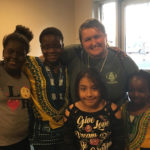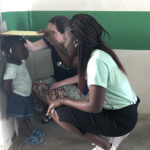For 11 days during Christmas break, I had the opportunity to travel to Lesvos, Greece, with a team to volunteer at a refugee camp. I have been on mission trips in the United States and Colombia before, but this experience was completely new for me. I was expecting it to be out of my comfort zone—which it was—but it was also much different than my other mission experiences.
 We worked seven 8-hour or 9-hours shifts at the camp, doing everything from serving breakfast and handing out tickets for a blanket distribution, to sorting socks and taking census in the living areas. It was exhausting and stretched my ability to persevere and deal with language and culture barriers. It was very heavy to be in a place with people in such broken situations.
We worked seven 8-hour or 9-hours shifts at the camp, doing everything from serving breakfast and handing out tickets for a blanket distribution, to sorting socks and taking census in the living areas. It was exhausting and stretched my ability to persevere and deal with language and culture barriers. It was very heavy to be in a place with people in such broken situations.
I saw beauty and ugliness contrasted like never before. The weather is freezing and people are living in tents, while the organization we worked through distributed free blankets. A drunk man shouted curse words and shook his fist at the camp, while a sweet child shouted “hello” and hugged me as I walked by. Hostility exists between families of different countries, while there is fellowship among unaccompanied minors who found themselves literally in the same boat. Religious literature is not allowed, while an organization runs events down the road where Bibles can be given. Everyone stands in line after line for meals and amenities, while people generously invite others into their tents for hot tea and a meal. Many do not know or understand the truth of God yet, while a boy became a Christian in Turkey and is now sharing the gospel with the other boys in the minors living section. More boats bring in more people to an already overcrowded place, while a bus brings people from camp to church every Sunday morning.
It is funny, because God spent all of this past semester teaching me to trust when I do not understand. Right now, I do not understand how God can be faithful to those people. I do not understand how God can use my service and the service of others to help them. I do not understand why the Lord chose me, of all people, to experience that. I do not understand why I am sitting in my heated home in America typing this on my laptop while other children of God are sitting in freezing tents in Greece, wondering when they will get a stamp to go to the next camp.
But I know beyond a shadow of a doubt that my understanding is not necessary in order for God’s kingdom to be triumphant. God is faithful. He does use my service and the service of others. He chose me specifically to do the tasks I did. He knows why each person is in each place and is present in both.
Having my eyes opened as I worked in that camp was certainly meaningful. It means I will now be an advocate for refugees. It means I furthered the kingdom of God in some way. It means I pray for the camp and its volunteers and inhabitants. It means I know the brokenness of our world. It means I do not understand it, and I am OK with that. It means God is still God, no matter what. It means the light shines in the darkness, and the darkness has not overcome it (John 1:5).
Amanda Finnigan, a freshman at Houston Baptist University, served with Go Now Mission in Greece.















We seek to connect God’s story and God’s people around the world. To learn more about God’s story, click here.
Send comments and feedback to Eric Black, our editor. For comments to be published, please specify “letter to the editor.” Maximum length for publication is 300 words.